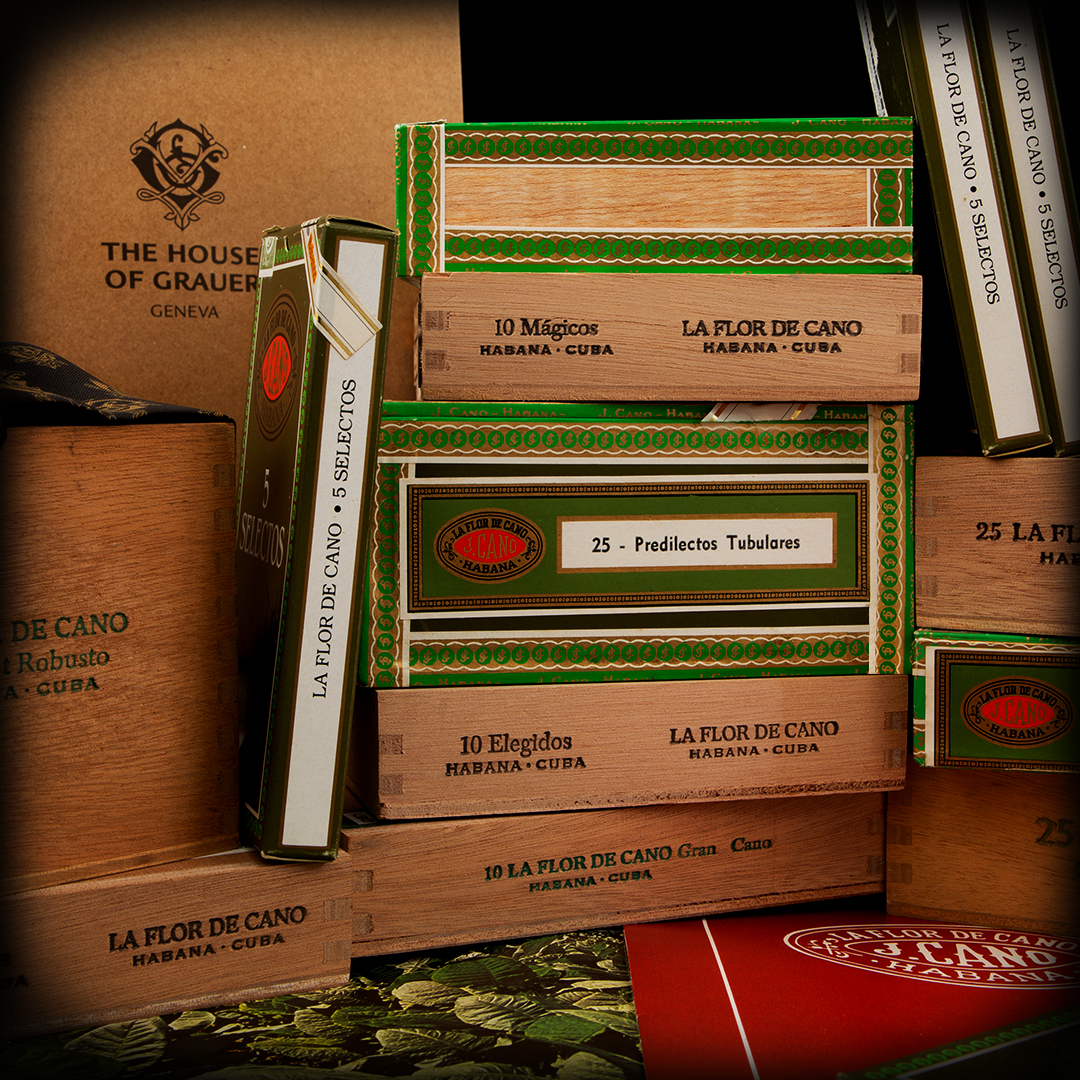La Flor de Cano
A small brand that has managed to resist thanks to the quality of its cigars.
From its creation in 1884 until the early 1960s, a period marked by the nationalisation of the tobacco industry by the Cuban government following the Cuban Revolution, La Flor de Cano seems to have always remained a small family business. This helps to explain the relatively brief history of the brand.
La Flor de Cano, or "Cano Loma & Co." as it was originally known, is a brand that predates the Cuban Revolution, registered in 1884 by the brothers Tomás and José Cano.
It was not until more than 50 years later that the brand was registered in 1940 as "Juan Cano Sainz" to the manufacturing-exporter register. This registration took place in the same year as the Rafaël González and El Rey del Mundo brands.
As mentioned earlier, La Flor de Cano has always seemed to be a small family business. However, by the time of the Cuban Revolution, the brand had established a solid reputation, particularly in the English and Spanish markets. British aficionados were particularly fond of La Flor de Cano Diademas and Short Churchill.
This enthusiasm for the brand enabled it to maintain its activity during the Cuban Revolution, as the Cubatabaco archives attest. However, despite this, production does not seem to have increased significantly and has instead decreased over the years. Indeed, while La Flor de Cano's regular catalogue, ranging from the Petit Corona to the Churchill, was relatively varied at the time, it now offers only two cigars.
The Elegidos, presented last year at the first edition of Habanos World Days, is the second cigar in the brand's regular catalogue. It has joined, almost 20 years after its introduction, the Petit Coronas (40 x 123 mm), dressed in a cedar wrapper.
The Elegidos is a Lirios (50 x 127 mm), a vitola exclusive to La Flor de Cano, and belongs to the large Robusto family. Indeed, this format is currently not found in any other Habanos brand catalogue.
Before that, the regular catalogue of the brand offered no less than 10 different cigars, all of which have now disappeared. Here is a short overview of them:
Let's start with the smallest of them, the Petit Coronas, a machine-made Standard Mano (40 × 123 mm) dressed with a cedar leaf. It was later replaced in 2002 by the current handmade Petit Coronas. Next in line are the Coronas, a Marevas (42 × 129 mm); the Cristales, measuring (41 × 150 mm), which was the only cigar in a glass tube still available after the Cuban Revolution of 1960; the Diademas, a Julieta No.2 (47 × 178 mm); the Gran Coronas, a Coronas Gordas (46 × 143 mm); the Iberos, a Vegueritos Mano (37 × 127 mm); the Predilectos Tubulares, another Standard Mano (40 × 123 mm), which we are presenting today; the Preferidos, another Vegueritos Mano (37 × 127 mm); the Selectos (41 × 150 mm), which was machine-made until 2002 and then hand-made until 2019, when it was discontinued; and finally the Short Churchill, a Robustos (50 × 124 mm).
La Flor de Cano cigars have always had a reputation for being smooth and refreshing. Floral and herbaceous aromas with a subtle sweetness, suitable for beginners as well as for experienced aficionados looking for a quality, light cigar to be enjoyed in the middle of the day.
Although the brand has never been the object of a special production, Edición Limitada, Colección Habanos, etc., it was, like many small brands, integrated into the Edición Regional programme. The latter is considered an ideal marketing method to promote these so-called "local" and "multi-local" brands.
Thus, despite its much reduced vitolario compared to that of the early 1980s, La Flor de Cano enjoys worldwide popularity, particularly thanks to its regional editions, which are relatively recurrent due to aficionados' appetite for the brand's remarkably balanced cigars.
The first region in the world to benefit from these taste qualities was the United Kingdom with the Short Robusto, a Petit Robustos (50 × 102 mm) released in 2010 in Edición Regional Reino Unido. This was followed by the Grandiosos in 2013, an Edmundo (52 × 135 mm) in Edición Regional Asia Pacifico; and then the Gran Cano in the same year, a Gordito (50 × 141 mm) in Edición Regional Gran Bretaña. The brand was then chosen by Canada to produce the Siboney, a Minutos (42 × 110 mm), released in 2014. Italy followed with the Casanova, a D No.5 (50 × 110 mm), released in 2016; Spain with the Mágicos (52 × 115 mm), released in 2018 and finally the Netherlands with the Robusto, a Robustos (50 × 124 mm) released in 2018 in Edición Regional Países Bajos.
In the past, some of the brand's cigars were machine-made, which made them considerably cheaper than handmade cigars. Today, as for the entire Habanos catalogue since 2006, the brand's cigars are hand-rolled, according to the "Totalmente a Mano" tradition. The brand's regular production cigars are made "Totalmente a Mano con Tripa Corta" (Short Filler) with leaves from the Vuelta Abajo and Semi Vuelta regions. This rolling technique involves the use of pieces of tobacco leaf to make up the filler, rather than the whole leaf as is the case for cigars "con Tripa Larga" (long filler). The wrapper is applied by hand in the traditional way.
The regional edition of La Flor de Cano cigars are nowadays all rolled "Totalmente a Mano con Tripa Larga" with tobacco leaves exclusively from the Vuelta Abajo region.
To learn more about La Flor de Cano cigars and the history of the brand, we would be delighted to welcome you to our walk-in humidor, where you will find exclusive pieces from the history of the brand, special productions, but also cigars in regular production.
Login to your online account to reserve your item
or contact us at +41 22 552 2799


